Overview
The article identifies the leading pharmaceutical industries that are at the forefront of healthcare innovation through a variety of strategies and advancements. It underscores how companies such as AbbVie, Pfizer, and Johnson & Johnson are utilizing:
- Data analytics
- Robust research and development
- Personalized medicine
to enhance patient care and improve health outcomes. Their significant contributions are pivotal to the evolving landscape of healthcare, illustrating the transformative impact these organizations have on the industry.
Introduction
In the rapidly evolving landscape of healthcare, pharmaceutical companies are increasingly adopting innovative strategies to enhance patient care and drive industry advancements. The integration of comprehensive data analytics is pivotal; organizations like CareSet are transforming the utilization of Medicare claims data, offering invaluable insights that inform product development and market access strategies. The commitment of the industry to address unmet medical needs is evident in the groundbreaking therapies developed by AbbVie in immunology and Pfizer’s leadership in vaccine development.
As companies navigate the complexities of healthcare, the focus on personalized medicine and data-driven decision-making is reshaping treatment methodologies, ultimately aiming to improve patient outcomes across various sectors. This article delves into the pivotal role of leading pharmaceutical companies in driving innovation and examines the impact of data analytics on their strategic initiatives.
CareSet: Comprehensive Medicare Data Insights for Pharmaceutical Innovation
CareSet leads the way in medical analytics by expertly extracting and interpreting complex Medicare claims data. With a remarkable examination of over $1.1 trillion in yearly claims, CareSet provides pharmaceutical companies with essential insights that not only improve care quality but also guide strategic initiatives. Their extensive services encompass:
- Identifying new service provider targets
- Analyzing prescribing behaviors
- Mapping individual care journeys
These capabilities are essential for fostering innovation within the top pharmaceutical industries, and the impact of Medicare data insights on pharmaceutical innovation is profound. Organizations that leverage these insights can make informed decisions that drive product development and market access strategies. Significantly, companies with fully integrated data systems experience 29% quicker decision-making processes across clinical and commercial operations, highlighting how CareSet’s robust data analytics can improve operational efficiency in today’s medical environment.
A recent case study titled ‘Unlocking Medicare Data to Empower HCP’ on an oncology treatment manufacturer demonstrated how timely interaction with medical providers regarding treatment options can significantly enhance outcomes for individuals. Organizations that emphasize analytics and foster a culture of evidence-based decision-making are more likely to innovate and enhance outcomes. This trend highlights the necessity for ongoing investment in digital health solutions, which is critical for future success in the top pharmaceutical industries and aligns with CareSet’s commitment to delivering high-quality insights. Expert opinions further reinforce the significance of Medicare claims data in medical analytics. As the landscape evolves, the ability to harness comprehensive data insights will be pivotal for top pharmaceutical industries aiming to enhance patient care and optimize their strategic initiatives. CareSet’s dedication to providing actionable Medicare insights positions it as a vital partner in navigating these complexities and driving innovation in healthcare.
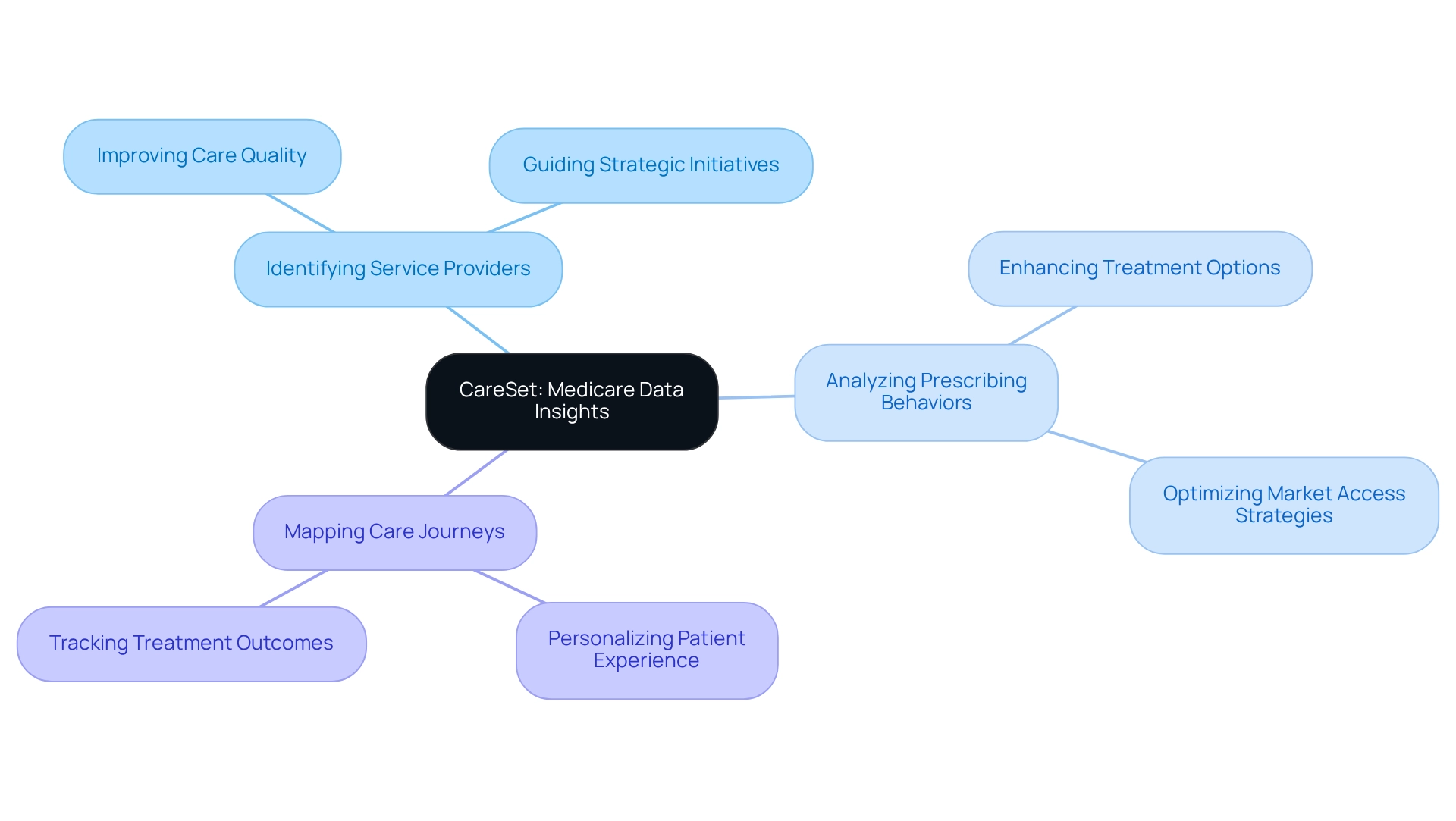
AbbVie: Pioneering Innovative Therapies in Immunology and Oncology
AbbVie has solidified its status as a leader in the development of innovative treatments, particularly in immunology and oncology. By 2025, AbbVie commands a significant share of the immunology market, driven by its flagship product, Humira, which has historically generated substantial revenue despite recent declines due to biosimilar competition. The organization’s unwavering commitment to research and development has led to the launch of groundbreaking solutions, including advancements in CAR-T approaches that are revolutionizing cancer care.
Recent innovations from AbbVie reflect a strategic emphasis on addressing unmet medical needs. Their therapies have enhanced individual outcomes and expanded options for previously challenging-to-manage conditions. This dedication to client care is evident in ongoing research projects aimed at improving care effectiveness and accessibility. Notably, the incorporation of Medicare data has empowered healthcare professionals to engage more effectively with patients regarding late-stage care alternatives, such as Qinlock for Gastrointestinal Stromal Tumor (GIST).
Current trends in immunology and oncology indicate a shift towards personalized medicine, with AbbVie at the forefront. Their research initiatives increasingly prioritize customizing treatments to individual profiles, thereby enhancing effectiveness. Real-world examples of AbbVie’s impact include their proactive strategy in developing treatments that cater to specific demographics, ensuring diverse groups benefit from advancements in medical science.
AbbVie’s innovative therapies have garnered recognition from industry specialists, underscoring the significance of their research in shaping the future of healthcare. The organization’s strategic initiatives address pressing healthcare challenges and create opportunities for long-term advancements in care methodologies. As AbbVie continues to innovate, its contributions to immunology and oncology are set to redefine standards of care and significantly improve patient outcomes.
Moreover, AbbVie has recently raised Rinvoq’s guidance by $300 million, underscoring its strong market performance and growth potential. Robert A. Michael, the chief executive officer, remarked, “Based on the progress we are making, we are well positioned for the long term.” This optimistic outlook is further bolstered by AbbVie’s pricing strategy for Humira, which, despite facing scrutiny due to a 60 percent increase in net price from 2016 to 2021, has substantially contributed to the company’s revenue generation prior to the introduction of biosimilars. As of 2025, AbbVie continues to maintain a substantial market share in immunology and oncology, reinforcing its leadership in the industry.
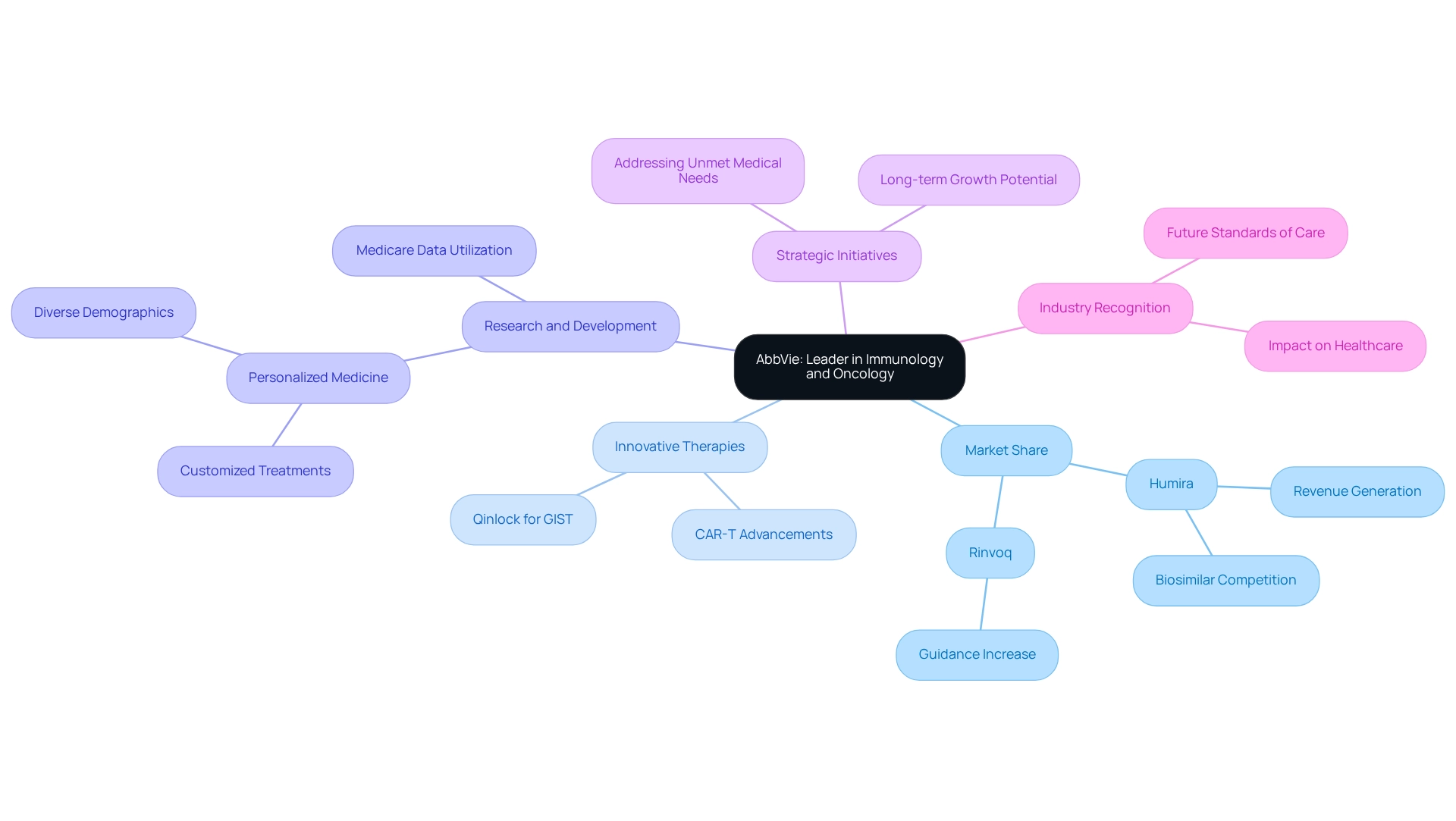
Pfizer: Leading Vaccine Development and Innovative Treatments
Pfizer has established itself as a leader in vaccine development, most notably with its COVID-19 vaccine, which was created in an unprecedented timeframe. This remarkable achievement underscores the company’s innovative methodologies and its capacity to leverage advanced technologies. As of 2023, Pfizer ranks as the sixth largest company in prescription sales among the top pharmaceutical industries, reflecting its strong market presence despite various challenges.
Beyond vaccines, Pfizer possesses a robust pipeline of therapies aimed at addressing a range of diseases, with notable advancements in oncology and rare diseases. Recent statistics indicate that by 2025, Pfizer continues to make significant progress in its therapeutic pipeline, concentrating on innovative therapies that meet unmet medical needs. For instance, Pfizer’s ongoing initiatives aim to enhance patient support and treatment effectiveness, focusing on solutions that not only tackle current health emergencies but also establish a foundation for future advancements in medical services.
The company’s collaborative efforts with global health organizations further exemplify its commitment to improving public health outcomes. As Lester Holt remarked, “Pfizer’s contributions to public health have been pivotal in addressing the challenges posed by the pandemic and beyond.” This dedication to research and development has positioned Pfizer among the top pharmaceutical industries, with updates on its COVID-19 vaccine developments as of May 2025 highlighting its ongoing impact in the field.
Moreover, CareSet’s groundbreaking data science offerings, which include advanced analytics and real-time data integration, are crucial for enhancing drug launch strategies and medical insights, particularly through the efficient application of Medicare data. By equipping medical providers with actionable insights, CareSet facilitates timely and meaningful engagement in treatment options, exemplified by its case studies in oncology, such as the one focusing on the 4th line of therapy for Qinlock in treating Gastrointestinal Stromal Tumor (GIST). This synergy between Pfizer’s advancements and CareSet’s data leadership emphasizes the significance of data-driven strategies in navigating the complexities of the pharmaceutical sector.
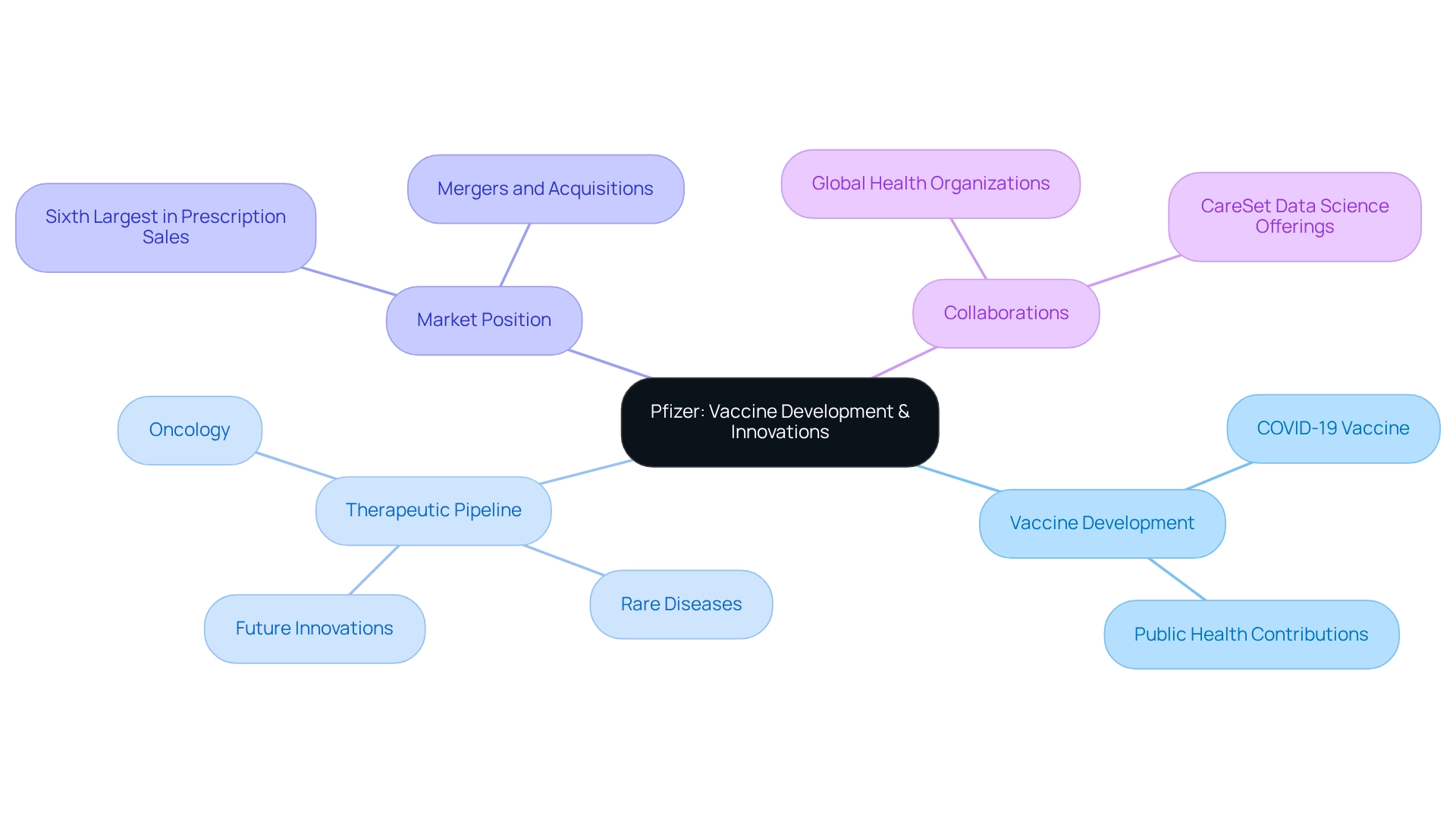
Johnson & Johnson: Diverse Innovations Across Health Sectors
Johnson & Johnson stands out with its extensive array of medical products, encompassing pharmaceuticals, medical devices, and consumer health items. The company’s commitment to innovation is particularly highlighted by its robust research initiatives in oncology and immunology. In Q1 2025, Johnson & Johnson reported a 2.4% increase in sales, reaching $21.89 billion, a testament to the strong performance of its innovative medicine segment. This growth underscores the effectiveness of their research and development efforts, which focus on integrating advanced technologies with patient-centered care strategies.
Recent advancements in medical products have positioned Johnson & Johnson as a leader in addressing critical health challenges. Their ongoing innovations in oncology are designed to enhance treatment efficacy and improve patient outcomes, while their immunology research aims to develop therapies that meet unmet medical needs. The company’s dedication to medical innovation is further evidenced by its full-year revenue guidance of $92 billion for 2025, surpassing analysts’ expectations and demonstrating its resilience and adaptability in a competitive market.
In contrast, Aurora Spine reported $17.6 million in revenue for fiscal year 2024, reflecting an increase of over 20%. As Cameron Cortigiano observed, this growth mirrors the broader trend of innovation and expansion within the top pharmaceutical industries. Other leaders in the top pharmaceutical industries, such as Novartis and Pfizer, contribute to this dynamic landscape, reinforcing Johnson & Johnson’s competitive position. Additionally, CareSet Systems has introduced innovative data science products that enhance drug launch strategies, providing valuable insights into provider engagement. Their recent case study on oncology care alternatives illustrates how leveraging Medicare data can empower medical providers and improve patient outcomes. Through these initiatives, Johnson & Johnson not only drives substantial advancements in healthcare but also sets a benchmark for the industry, emphasizing the importance of patient-focused approaches in the development of new treatments and medical solutions. For Pharmaceutical Market Access Managers, grasping these trends and innovations can yield valuable insights for strategic planning and market positioning.
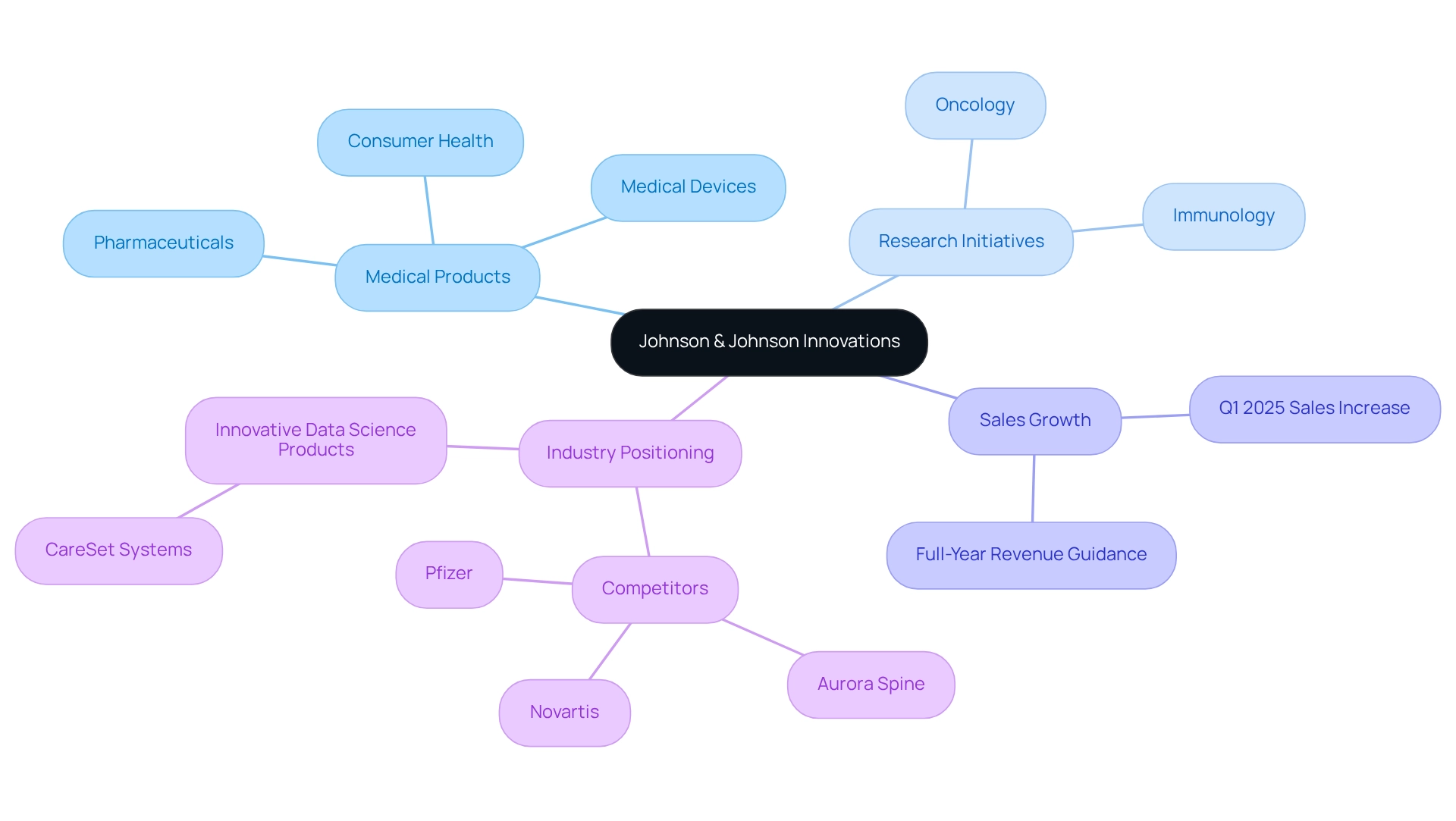
Merck & Co.: Advancing Immunotherapy and Vaccine Development
Merck & Co. stands at the forefront of immunotherapy, particularly with its groundbreaking drug Keytruda, which has transformed cancer treatment across various indications. Recent statistics reveal that combination treatments involving Keytruda have reduced the risk of disease progression or death by 40% compared to traditional chemotherapy in pivotal Phase III trials. This remarkable advancement underscores the drug’s efficacy and its pivotal role in enhancing patient outcomes.
The firm’s ongoing exploration of innovative vaccine technologies and combination treatments further exemplifies its dedication to improving care for patients. Initial findings from trials indicate lasting benefits for individuals receiving Keytruda alongside other therapies, highlighting the potential for synergistic effects in oncology. As Steve Worland, president and CEO of eFFECTOR Therapeutics, remarked, “The addition of tomivosertib to Keytruda slows down immune exhaustion and reverses resistance to checkpoint inhibitors,” illustrating the innovative strategies being pursued.
Merck’s commitment to innovation is crucial not only for addressing the escalating challenges in oncology but also extends to infectious diseases, where new vaccine technologies are being developed. Real-world evidence of Keytruda’s impact on cancer care showcases its transformative role, as numerous patients have reported improved survival rates and quality of life.
In conclusion, Merck & Co.’s strides in immunotherapy, particularly through Keytruda, exemplify the company’s strategic focus on innovative solutions that tackle critical medical challenges. These advancements not only enhance care for patients but also position Merck as a key player in the pharmaceutical landscape, driving significant improvements in health outcomes.
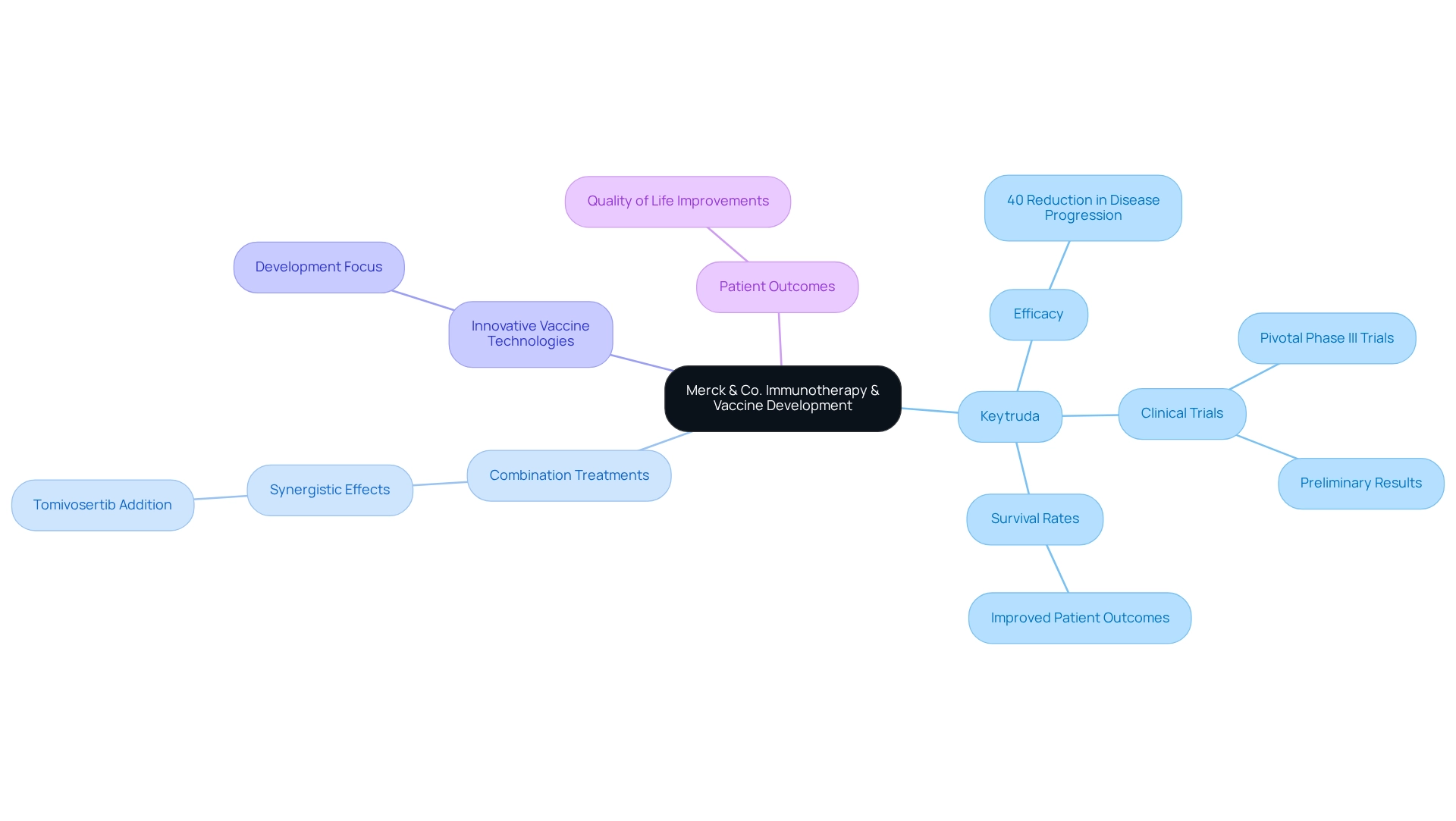
Roche: Innovating Personalized Healthcare and Diagnostics
Roche: Innovating Personalized Healthcare and Diagnostics
Roche stands at the forefront of personalized healthcare, pioneering the development of targeted therapies and advanced diagnostics. By utilizing data analytics in its research processes, Roche enhances the accuracy of treatment options tailored to individual needs. Notably, the company’s innovations in diagnostics, including liquid biopsies, are revolutionizing early disease detection and monitoring, setting new benchmarks in the industry.
In 2025, Roche’s advancements in diagnostics significantly impacted disease detection rates, enabling healthcare providers to identify conditions earlier and more accurately. For instance, their collaboration with Accenture on the NAVIFY Tumor Board solution exemplifies how integrating patient data from various IT systems can streamline oncology workflows, ultimately improving decision-making and patient outcomes. This collaboration emphasizes the essential function of diagnostics in personalized healthcare, particularly in oncology, where prompt actions can lead to improved decision-making.
Furthermore, insights obtained from Medicare data, as illustrated in the case study “Putting Patients First: Unlocking Medicare Data to Empower HCP” by CareSet, demonstrate how oncology product manufacturers can enhance engagement with healthcare providers regarding late-stage options such as Qinlock for Gastrointestinal Stromal Tumor (GIST). By leveraging such data, Roche can further refine its strategies to connect with physicians, ensuring they are informed about the latest treatment options available.
As Nikhilesh Ravindra Patel, a Senior Consultant, notes, “His deep understanding of the market dynamics and ability to pinpoint growth areas make him an invaluable asset in guiding clients toward informed business decisions.” This insight underscores Roche’s strategic positioning in the evolving landscape of targeted therapies and diagnostics.
However, Roche also faces challenges such as the lack of reimbursement policies and the complexity of molecular data, which can impact the implementation of their innovations. As Roche continues to innovate, its dedication to personalized healthcare not only enhances care for individuals but also establishes the company as a leader in the industry. The continuous improvements in their diagnostic technologies, along with the tactical application of Medicare data, are anticipated to further revolutionize early disease identification, ensuring that individuals obtain the most efficient solutions tailored to their specific profiles.
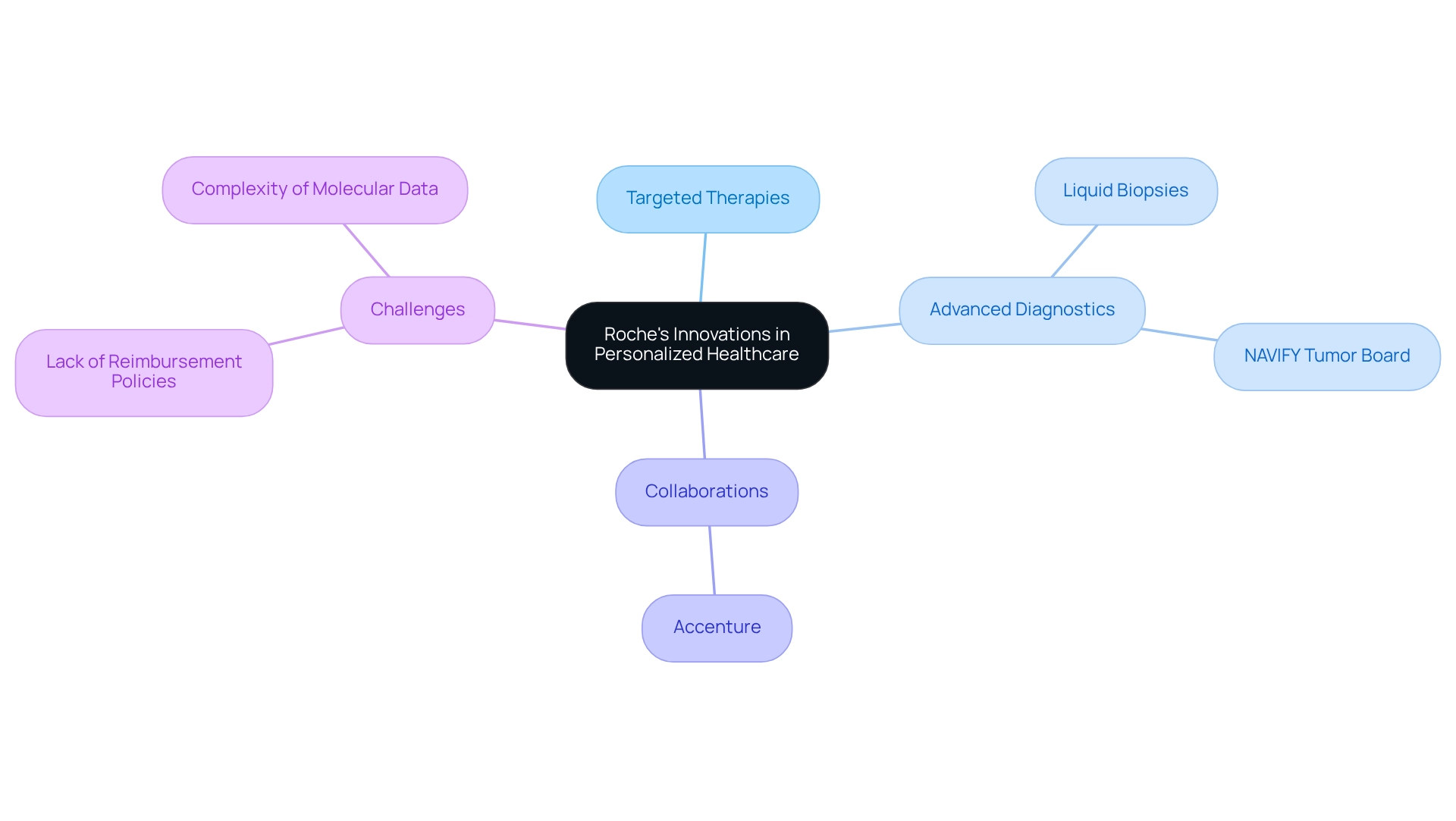
AstraZeneca: Innovations in Respiratory and Cardiovascular Treatments
AstraZeneca has firmly established itself as a leader in the treatment of respiratory and cardiovascular diseases, boasting a robust portfolio of medications for conditions such as asthma and chronic obstructive pulmonary disease (COPD). The firm’s innovative research initiatives are focused on developing therapies that not only enhance outcomes for individuals but also significantly improve quality of life. In 2025, AstraZeneca’s advancements in respiratory solutions were underscored by notable clinical trial results, demonstrating the efficacy of their medications in managing asthma and COPD.
The company’s commitment to addressing these health challenges is evident through strategic collaborations aimed at advancing respiratory care. Recent studies indicate that their medications have led to a substantial reduction in hospitalizations among asthma patients, highlighting the profound impact of their research on patient care. As emphasized by the National Heart, Lung, and Blood Institute, “Asthma can be a serious and life-threatening condition, but with appropriate care and self-management, individuals with asthma can lead healthy and active lives.”
Furthermore, AstraZeneca’s innovations in cardiovascular medications have shown promising results, with ongoing trials revealing enhanced efficacy in managing cardiovascular diseases. The integration of real-world data, including insights from CareSet’s examination of over 100 external data sources, has empowered AstraZeneca to refine its therapeutic strategies. CareSet’s data science products, characterized by advanced analytics and predictive modeling, play a crucial role in enhancing drug launch strategies and medical insights, ensuring individuals receive the most effective therapies available.
As the landscape of respiratory and cardiovascular treatments continues to evolve, AstraZeneca remains at the forefront, leveraging its extensive research capabilities to drive meaningful advancements. Their dedication to enhancing patient outcomes is reflected in the positive feedback from both medical professionals and patients, underscoring the significance of innovative solutions in tackling these prevalent health issues. Moreover, AstraZeneca’s innovations contribute to broader medical strategies, aligning with CareSet’s commitment to fostering long-term strategic growth for medical partners.
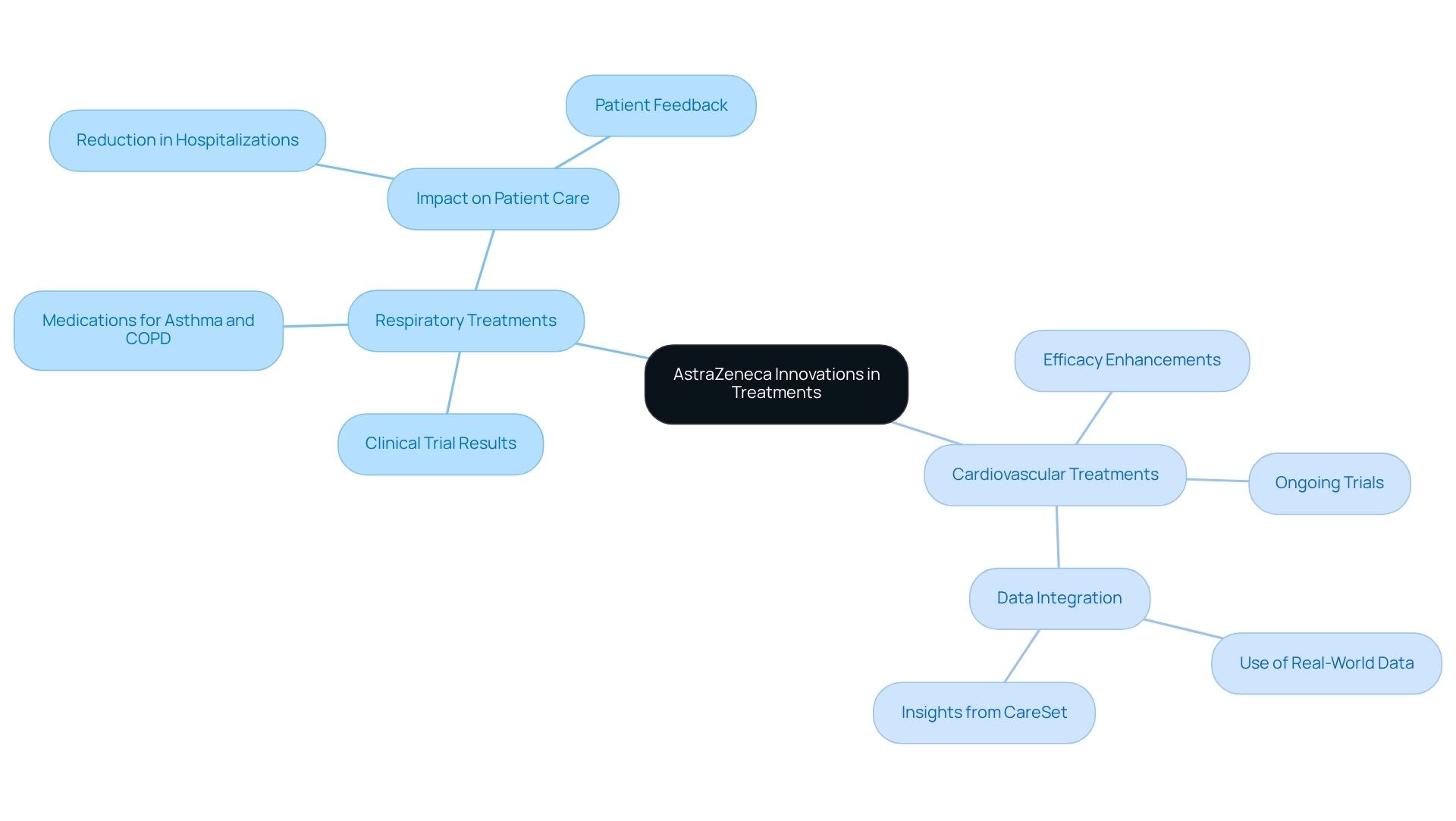
Novartis: Leading Research in Gene Therapy and Advanced Medicines
Novartis stands at the forefront of gene research, pioneering innovative solutions that target genetic disorders and rare diseases. The firm’s unwavering commitment to enhancing healthcare is evident in its diverse range of treatments, particularly in CAR-T cell therapies for cancer. By 2025, Novartis has achieved remarkable progress in CAR-T treatments, demonstrating their potential to revolutionize patient outcomes. Notably, the recent FDA endorsement of Zolgensma, a gene therapy for spinal muscular atrophy (SMA), exemplifies the impact of Novartis’s research.
Initially restricted to children under the age of 2, this breakthrough has opened doors for future treatments, underscoring the importance of ongoing research in expanding access to life-saving interventions. Nonetheless, it is crucial to acknowledge that the FDA placed a 20-month hold on a trial assessing an alternative administration of Zolgensma, highlighting the challenges faced in the pursuit of advancing gene therapies.
Furthermore, Novartis plans to submit applications for OAV101 IT in the first half of 2025, signaling continued progress in gene treatment. As Dr. Seuss wisely noted, “Only you can control your future,” a sentiment that resonates deeply with Novartis’s commitment to research and development. This dedication not only underscores the transformative potential of gene therapy but also positions Novartis as a leader in the evolving landscape of advanced medicines for genetic disorders.
The case study titled “Zolgensma Approval and Its Impact” further illustrates this narrative, revealing that many older children and adults with SMA were left waiting for alternative care options due to safety concerns that postponed further trials. This persistent demand for innovation highlights the vital role Novartis plays in shaping the future of genetic medicine.
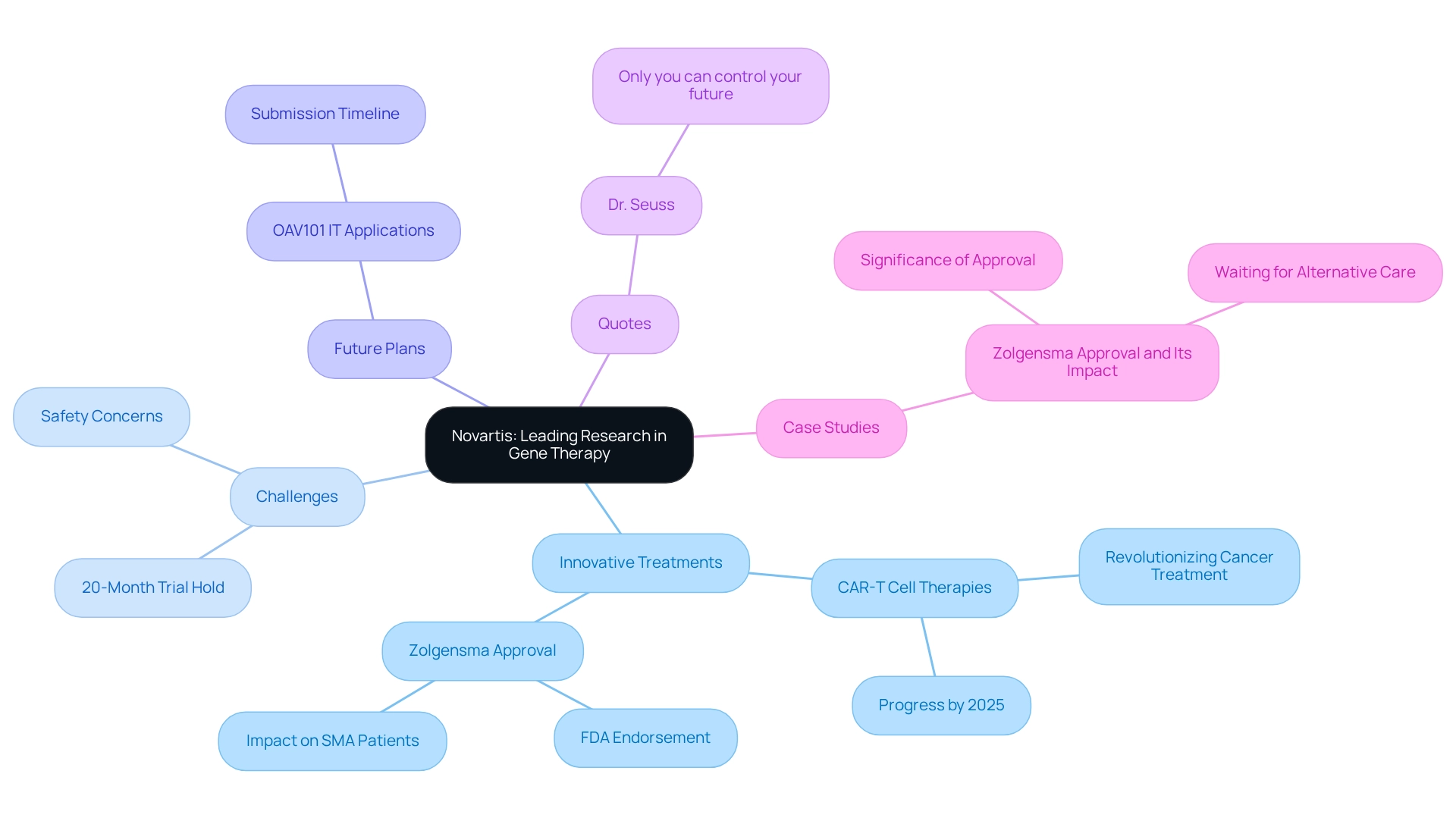
Bristol Myers Squibb: Breakthrough Innovations in Oncology and Immunology
Bristol Myers Squibb (BMS) has firmly established itself as a leader in oncology and immunology, primarily through its groundbreaking treatments, Opdivo and Yervoy. These therapies have significantly transformed the cancer care landscape, instilling new hope in individuals facing previously daunting diagnoses. BMS’s commitment to expanding its influence in the immunotherapy arena is evident in its ongoing research into combination treatments and innovative immunotherapies, all aimed at enhancing treatment effectiveness and outcomes for patients.
The impact of Opdivo and Yervoy transcends individual patient care; they represent a paradigm shift in the approach to cancer treatment, particularly in immunotherapy. As of 2025, the latest research reveals that these therapies continue to exhibit robust effectiveness, with ongoing studies investigating their potential across various cancer types. Notably, recent statistics show that Opdivo and Yervoy have improved survival rates by 30% in specific patient groups. Expert opinions within the oncology community emphasize the significance of these innovations, highlighting that they not only elevate survival rates but also enhance patients’ quality of life.
BMS’s strategic emphasis on breakthrough innovations is vital for navigating the evolving challenges within oncology. The company is adeptly maneuvering through a complex landscape shaped by regulatory changes and market dynamics, yet it remains steadfast in its dedication to maximizing the potential of its growth portfolio. According to the case study titled “Bristol Myers Squibb’s Pipeline Advancement,” the company is focused on optimizing its growth portfolio and pipeline in light of challenges posed by the Inflation Reduction Act and the potential loss of exclusivity on key products. With a promising pipeline of innovative products, BMS is well-positioned to emerge as one of the top pharmaceutical industries and a top-tier growth innovator by the end of the decade, reinforcing its commitment to transforming cancer care through continuous innovation.
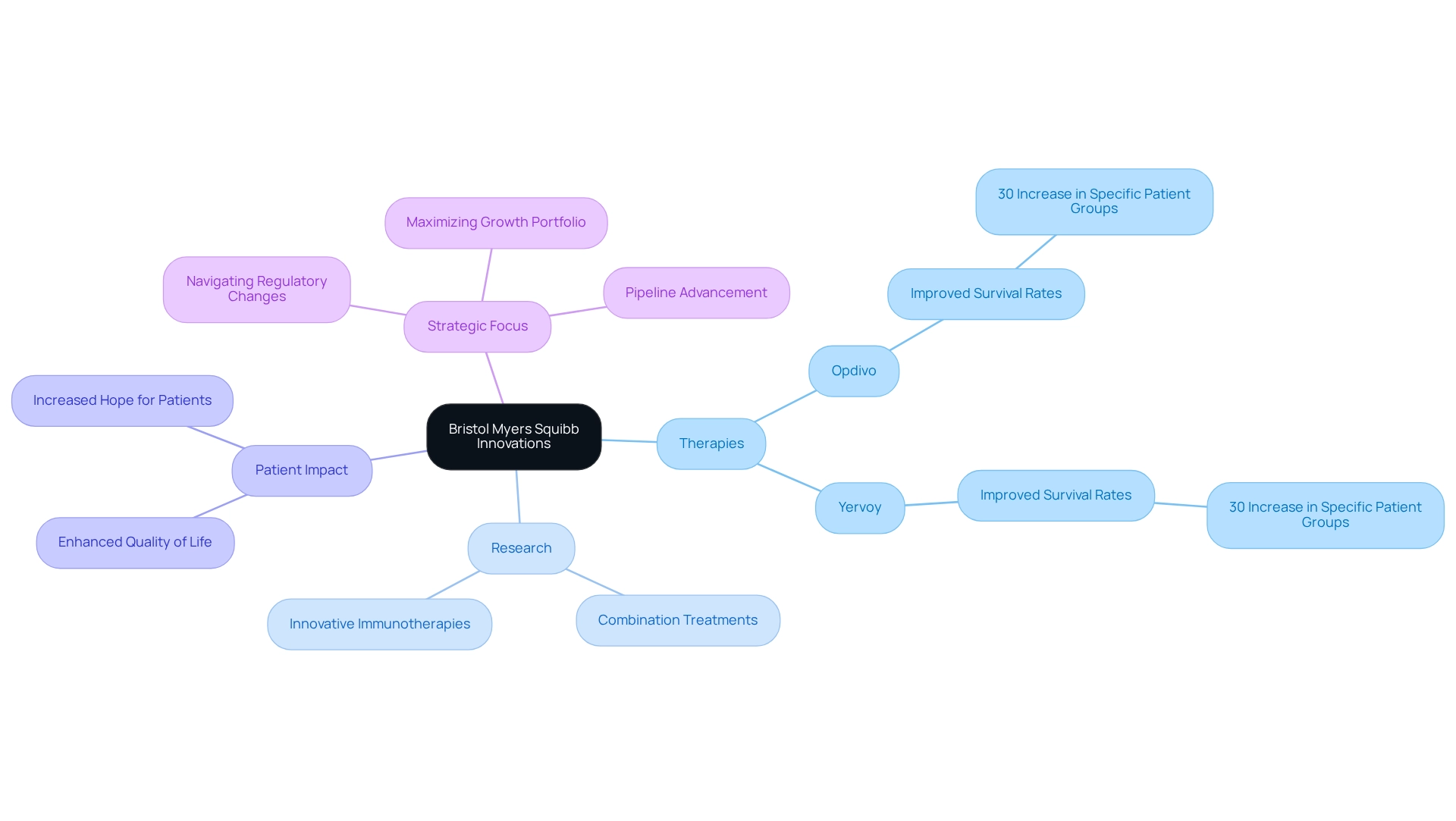
Gilead Sciences: Leading Innovations in Antiviral Therapies
Gilead Sciences stands at the forefront of antiviral treatment development, particularly in HIV management and prevention. The organization is renowned for its groundbreaking approaches, including long-lasting treatments and combination protocols, which are redefining benchmarks in addressing viral infections. Gilead’s unwavering commitment to research and development is pivotal in confronting the persistent challenges posed by viral diseases, ultimately enhancing patient care.
Recent advancements feature Gilead’s ‘Find Your Four’ initiative, which empowers individuals to become better allies to the HIV community. This initiative reflects the company’s holistic approach to tackling the epidemic, underscoring the significance of collaboration across sectors. As Tokunbo Soyemi, senior director of global medical affairs, articulates, “Only through a united, multi-sector approach can we drive meaningful progress to end the HIV epidemic for everyone, everywhere.”
In 2025, Gilead continues to advance HIV care, with substantial updates showcasing the effectiveness of its solutions. For instance, at Week 26 of a recent study, 0% of participants receiving a combination of LEN + TAB with high-dose ZAB exhibited an HIV viral load ≥50 copies/mL, underscoring the efficacy of Gilead’s innovative therapeutic regimens.
Moreover, Gilead’s antiviral treatment innovations extend beyond HIV. A notable case study on Veklury demonstrated its potent activity against SARS-CoV-2 variants, reaffirming its relevance in the ongoing fight against COVID-19. This analysis not only highlights Gilead’s adaptability in the face of emerging viral threats but also reinforces its leadership in antiviral research. John C. Martin has expressed optimism regarding the rapid advancements in science and technology resulting from the pandemic, further emphasizing Gilead’s proactive stance in innovation.
As the landscape of HIV care evolves, Gilead remains steadfast in providing innovative solutions that enhance individual outcomes and promote long-term health progress. The company’s focus on transparency and data-driven insights ensures that both healthcare providers and patients benefit from the latest innovations in antiviral therapies. In conclusion, Gilead’s ongoing efforts in research and development are crucial for enhancing treatment options and addressing the evolving challenges in viral disease management.
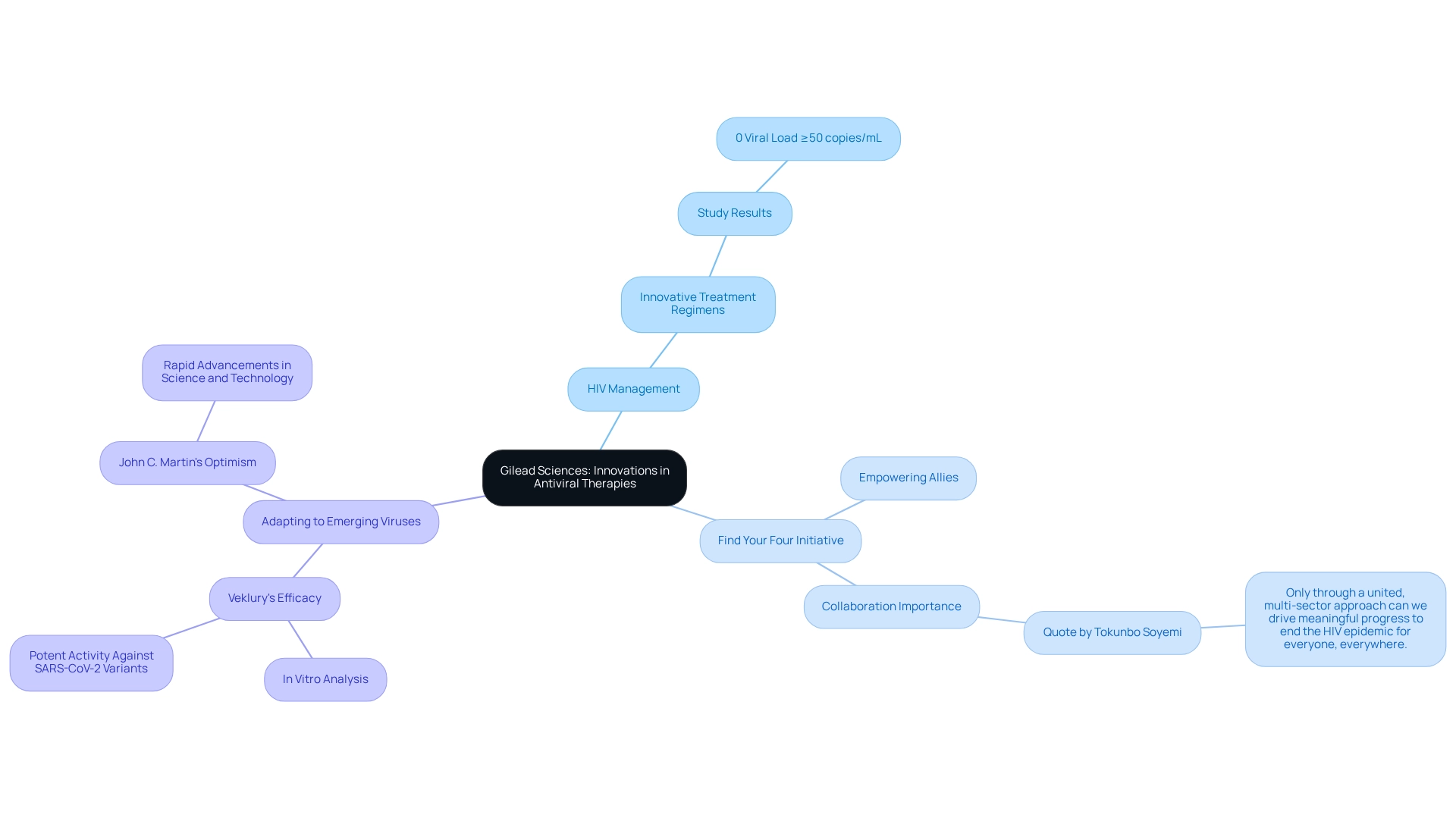
Conclusion
The pharmaceutical industry is experiencing a significant transformation, driven by innovative strategies and the integration of data analytics. Companies like CareSet are at the forefront, utilizing comprehensive Medicare claims data to provide critical insights that enhance patient care and inform strategic initiatives. This ability to leverage data accelerates decision-making processes and fosters a culture of evidence-based practices, ultimately leading to improved patient outcomes.
Major players such as AbbVie and Pfizer exemplify how targeted therapies and personalized medicine are reshaping treatment methodologies. By focusing on unmet medical needs, these companies are developing groundbreaking therapies that address complex health challenges in areas like oncology and immunology. Their commitment to research and development is evident, with advancements in CAR-T therapies and innovative vaccines demonstrating potential to redefine standards of care.
Furthermore, organizations like Johnson & Johnson and Merck & Co. are pushing the boundaries of healthcare innovation through diverse product portfolios and cutting-edge treatments. Their strategic focus on patient-centered approaches and the integration of data analytics into their operations enhances their ability to respond to evolving healthcare demands.
In summary, the synergy between data-driven insights and pharmaceutical innovation is setting the stage for a new era in healthcare. As companies continue to embrace these advancements, the ultimate goal remains clear: to improve patient outcomes and deliver effective, personalized therapies that meet the needs of diverse populations. This commitment to innovation not only shapes the future of the pharmaceutical landscape but also holds the promise of transforming the lives of patients worldwide.


